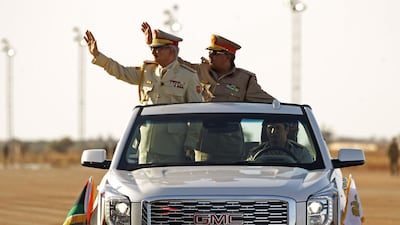ISIS has claimed responsibility for two bomb blasts that injured at least 18 people in the eastern coastal city of Derna on Sunday, the first attack the group has claimed in the city since 2016.
It announced the claim of the targeted attack against a military unit of Field Marshal Khalifa Haftar’s Libyan National Army (LNA) on its self-styled news agency’s channel on encrypted app Telegram on Tuesday, claiming 19 people were either killed or injured, by a “platoon” of the group.
“As part of a ‘wearing invasion’, a security platoon was able yesterday to detonate two car bombs near two headquarters where Haftar forces are based in Derna city, claiming the lives and wounding 19 of them,” the statement said in Arabic.
The militant group controlled the city until it was ousted by the forces of Field Marshal Khalifa Haftar and rival militias in mid-2016. The attack will raise fears that the group has returned to the city in some form.
Derna, once a militant bastion, is about 292 kilometres (182 miles) distant from Libya's second city, Benghazi, and was declared to be under the complete control of Field Marshal Khalifa Haftar's LNA in June 2018.
The city of around 100,000 people, situated on the emerald waters of the Mediterranean, has played host to fighters sympathetic to Al Qaeda, an ISIS occupation and one of Egypt’s most wanted militants.
Last week, the LNA extradited Hisham El Ashmawi back to Egypt after he was captured in Derna. He had once pledged allegiance to ISIS before switching sides once more to Al Qaeda. He is believed to be involved in several attacks in Egypt’s Western Desert near the Libyan border.
The attacks include a 2017 ambush that killed nearly 30 Christian pilgrims travelling to a remote monastery, an attack on a military checkpoint that killed more than two dozen troops.
After the removal of long-time ruler Muammar Qaddafi in a Nato-backed uprising in 2011, militant groups Al Qaeda and ISIS have used the oil-rich country as a base for attacks, exploiting its chaos and lack of security.
Meanwhile, the head of Libya's National Oil Company warned Monday against a "collapse in production" stemming from conflict in the North African country, where Field Marshal Haftar has launched an offensive against Tripoli – seat of the internationally recognised Government of National Accord (GNA).
Oil production "could collapse at any moment", said NOC chairman Mustafa Sanalla, even as he cited current output of over a million barrels per day.
But output could potentially fall by 95 percent, Mr Sanalla said, in a video published on social media networks.
Oil export terminals were not immune from the conflict, he said, recalling that the northeast of the country – nicknamed the "oil crescent" – had been at the centre at previous rounds of violence.
"The conflict could reach the oil sites" if the fighting in southern Tripoli escalates, Mr Sanalla said.

